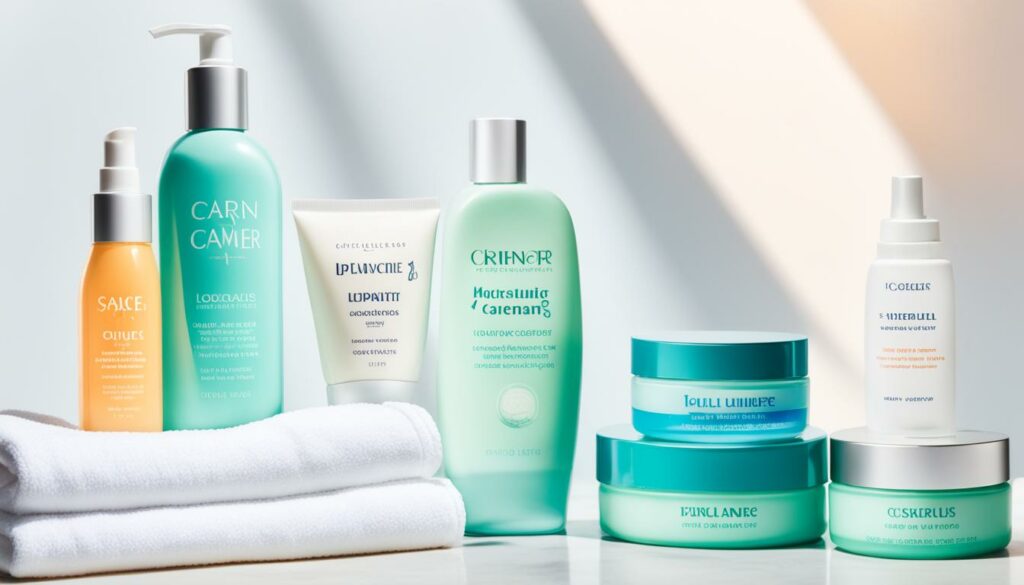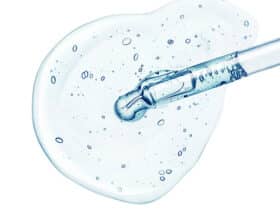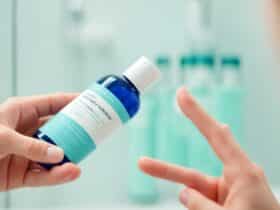Dry skin is a common issue that can cause itchiness, flakiness, and discomfort. If you’re dealing with dry skin, it’s essential to take the right steps to soothe and heal your skin. Dermatologists provide expert tips and recommend specific remedies and products for dry skin.
In this article, we will explore the top dermatologist tips for dry skin and the best products and treatments recommended by dermatologists. By following these expert recommendations, you can achieve healthier, more hydrated skin and alleviate dryness and discomfort.
Key Takeaways:
- Consult a dermatologist for a personalized dry skin treatment plan.
- Prevent dryness during baths and showers by using warm water and gentle soaps.
- Choose moisturizers with healing ingredients like lactic acid and hyaluronic acid.
- Consider lifestyle measures such as exfoliation, staying hydrated, and eating skin-nourishing foods.
- Seek professional help if over-the-counter products and home remedies do not provide relief.
Preventing Dry Skin during Showers and Baths
To prevent dry skin during showers and baths, it is important to take certain precautions. Follow these expert tips to keep your skin moisturized and healthy:
- Limit Your Time: Keep your showers and baths short to prevent excessive moisture loss from your skin. Prolonged exposure to water can strip away the natural oils that keep your skin hydrated.
- Use Warm Water: While hot water may be relaxing, it can be harsh on your skin, leading to dryness and irritation. Instead, opt for warm water when bathing to avoid excessive drying.
- Choose Gentle Soap: Use a gentle, fragrance-free soap or body wash specifically formulated for dry skin. Harsh soaps and cleansers can strip away the skin’s natural oils, worsening dryness.
- Avoid Excessive Lather: Thick lather may feel luxurious, but it can also be drying for your skin. Use a small amount of soap or body wash, and avoid excessive lathering, especially in areas prone to dryness.
- Pat Dry: After bathing, gently pat dry your skin with a soft towel. Avoid rubbing or vigorous drying, as it can further aggravate dryness and lead to irritation.
- Moisturize Immediately: The key to preventing dry skin after bathing is to lock in the moisture. As soon as you dry your skin, apply a rich, hydrating moisturizer to seal in the existing moisture and keep your skin soft and supple.
By following these tips, you can minimize the risk of dryness and keep your skin healthy and hydrated. Remember, prevention is key when it comes to maintaining optimal skin moisture.
Expert Tip:
“Using lukewarm water instead of hot and applying moisturizer immediately after washing are simple yet effective ways to prevent dry skin and maintain its natural moisture balance.” – Dr. Jessica Hernandez, Dermatologist
| Preventing Dry Skin during Showers and Baths | Tips |
|---|---|
| Limit your time | Keep showers and baths short to prevent excessive moisture loss. |
| Use warm water | Opt for warm water instead of hot to avoid drying out your skin. |
| Choose gentle soap | Use a gentle, fragrance-free soap or body wash for dry skin. |
| Avoid excessive lather | Use a small amount of soap and avoid excessive lathering. |
| Pat dry | Gently pat dry your skin with a soft towel to avoid irritation. |
| Apply moisturizer immediately | Lock in moisture by applying a hydrating moisturizer right after drying. |
Choosing the Right Moisturizer for Dry Skin
Dermatologists highly recommend choosing the right moisturizer to effectively combat dry skin. When it comes to addressing this concern, ointments and creams tend to be more beneficial compared to lotions. These products are specifically designed to trap moisture in the skin, providing optimal hydration and minimizing irritation.
When selecting a moisturizer for dry skin, it is essential to look for specific ingredients that can effectively soothe and hydrate the skin. Natural oils like olive oil and jojoba oil are excellent options as they possess excellent moisturizing properties and help restore the skin’s natural moisture barrier.
Additionally, certain key components, such as lactic acid, hyaluronic acid, lanolin, mineral oil, and petrolatum, can provide the much-needed nourishment and hydration for dry skin. These ingredients work together to replenish moisture and enhance the skin’s overall health and appearance.
To further protect your skin from dryness, it is also crucial to wear a lip balm regularly. Lips are prone to dryness and chapping, so keeping them moisturized is essential for maintaining healthy, hydrated skin.
Treating Dry Skin with Over-the-Counter Products
Over-the-counter products can be an effective solution for treating dry skin. These readily available skincare options can help moisturize and replenish the skin, providing relief from dryness and discomfort. However, it’s essential to choose the right products that match your skin’s needs and preferences.
When selecting over-the-counter moisturizers for dry skin, look for products specifically formulated to provide intense hydration. Opt for creams or ointments instead of lotions, as they have a thicker consistency that helps lock in moisture and create a protective barrier on the skin’s surface. Moisturizers with ingredients like hyaluronic acid, shea butter, and ceramides can provide deep hydration and nourishment.
In addition to moisturizers, there are other over-the-counter products that can benefit dry skin. Makeup for dry skin should be hydrating and contain moisturizing ingredients to prevent further dryness and flakiness. Look for foundations and powders with added moisturizers, such as hyaluronic acid or glycerin, to keep your skin hydrated and smooth throughout the day.
When introducing new skincare products into your routine, it’s important to self-test them at home. Apply a small amount of the product to a small, inconspicuous area of your skin and wait for at least 24 hours to check for any adverse reactions. This process helps identify any allergies or sensitivities before applying the product to your entire face or body.
If you experience an allergic reaction or if your dry skin persists despite using over-the-counter products, it’s recommended to consult a dermatologist. They can provide expert guidance and recommend suitable treatment options for your specific skin condition. Dr. Sasha Haberle at Metrolina Dermatology in South Charlotte offers personalized treatment plans for dry skin, ensuring you receive the care and attention your skin deserves.
| Product | Description |
|---|---|
| Hydrating Cream | This rich cream deeply moisturizes the skin, leaving it soft and supple. Enriched with hyaluronic acid and shea butter, it replenishes and locks in moisture. |
| Moisturizing Foundation | Designed for dry skin, this foundation provides excellent coverage while keeping the skin hydrated. Formulated with hydrating ingredients like glycerin and ceramides, it ensures a flawless finish. |
| Gentle Cleanser | This fragrance-free cleanser gently removes impurities without stripping the skin of its natural oils, making it ideal for dry and sensitive skin types. It leaves the skin refreshed and moisturized. |
Remember, finding the right over-the-counter products for your dry skin is a trial-and-error process. Everyone’s skin is unique, so what works for one person might not work for another. Be patient, and don’t hesitate to seek professional advice for long-standing or severe dry skin concerns. With the right products and proper skincare routine, you can restore moisture and achieve healthy, hydrated skin.

Lifestyle Measures for Managing Dry Skin
In addition to skincare products, there are lifestyle measures that can help manage dry skin. Incorporating these habits into your daily routine can make a significant difference in the health and appearance of your skin.
Gentle Exfoliation
Gentle exfoliation is an effective way to remove dead skin cells and improve the texture of your skin. Try using a dry brush or a scrub specifically designed for dry skin. Always remember to be gentle and avoid scrubbing too hard, as this can cause further irritation.
Staying Hydrated
One of the simplest and most important lifestyle measures for managing dry skin is staying hydrated. Drinking enough water throughout the day helps maintain the natural moisture balance of your skin. Aim to drink at least 8 glasses of water daily.
Eating Skin-Healthy Foods
The foods you eat can also play a role in maintaining healthy skin. Incorporate foods rich in carotene and omega-6 fatty acids into your diet. Some examples include avocados, sweet potatoes, carrots, and fatty fish like salmon.
Overall, adopting these lifestyle measures can help improve dry skin, promoting a healthier and more radiant complexion.
| Lifestyle Measures for Managing Dry Skin | Benefits |
|---|---|
| Gentle Exfoliation | Removes dead skin cells Improves skin texture |
| Staying Hydrated | Maintains skin moisture balance Promotes overall skin health |
| Eating Skin-Healthy Foods | Nourishes skin from the inside out Provides essential nutrients for skin health |
Note: Incorporate these lifestyle measures alongside the dermatologist-recommended tips discussed in the previous sections for optimal dry skin management.

Treatment Options for Dry Skin
If lifestyle measures and over-the-counter products are not sufficient, dermatologists may recommend treatment options for dry skin. These options include prescription creams or ointments for more severe cases and hydrocortisone lotions for itchy dry skin. Additionally, wet dressings may be used to prevent infection in cracked skin.
“Prescription creams or ointments can provide targeted relief for dry skin that persists despite other treatments. These medications are usually stronger and more effective at moisturizing and healing dry skin. Your dermatologist will carefully evaluate your condition and prescribe the most appropriate treatment option for you.”
Hydrocortisone is a topical corticosteroid that can help reduce inflammation and relieve itching associated with dry skin. It is commonly used for itchy dry skin conditions, such as eczema. However, it’s important to use hydrocortisone under the guidance and supervision of a healthcare professional to ensure proper use and minimize potential side effects.
Wet dressings can be applied to cracked skin to promote healing and prevent infection. The dressings are typically soaked in water or a medicated solution and applied to the affected areas. They help soothe and moisturize the skin while creating a protective barrier.
It is essential to consult with a dermatologist before starting any prescription treatment or using hydrocortisone or wet dressings. A dermatologist will assess your condition and provide personalized recommendations to effectively treat your dry skin.
Treatment Options for Dry Skin: Pros and Cons
| Treatment Option | Pros | Cons |
|---|---|---|
| Prescription creams/ointments |
|
|
| Hydrocortisone lotions |
|
|
| Wet dressings |
|
|
Note: The pros and cons listed above are general considerations. Consult with a dermatologist for personalized advice and recommendations.
Home Remedies and Self-Care for Dry Skin
In addition to medical treatments, there are several home remedies and self-care practices that can help alleviate dry skin. By incorporating these remedies into your daily routine, you can provide nourishment and hydration to your skin.
Gentle Face Washing
Gentle face washing is essential for individuals with dry skin. Avoid using harsh cleansers that strip away natural oils and opt for nonfoaming cleansers instead. Look for products that are specifically formulated for dry and sensitive skin. Take care not to scrub vigorously, as this can further irritate the skin.
Moisturizing Tips
Moisturization is key to combatting dry skin. Apply topical medication and moisturizer immediately after washing your face or taking a shower while your skin is still damp. This helps to lock in moisture and keep your skin hydrated throughout the day. Choose moisturizers that contain healing ingredients like urea and ceramides, as these help to repair and replenish the skin barrier.
Using a Humidifier
Adding moisture to the air in your home can help relieve dry skin. Use a humidifier, especially during the winter months when the air tends to be drier. This will help prevent excessive evaporation of moisture from your skin, keeping it hydrated and supple.
Choosing Skin-Friendly Fabrics
The choice of fabrics can also impact the health of your skin. Opt for skin-friendly fabrics like cotton, as they are breathable and gentle on the skin. Avoid wearing harsh materials like wool or synthetic fabrics, as they can cause irritation and exacerbate dryness.
| Home Remedies for Dry Skin | Benefits |
|---|---|
| Gentle face washing with nonfoaming cleansers | Prevents stripping of natural oils and irritation |
| Moisturizing while the skin is still damp | Locks in moisture and hydrates the skin |
| Using a humidifier | Adds moisture to the air and prevents dryness |
| Choosing skin-friendly fabrics | Prevents skin irritation and dryness |
“By incorporating these home remedies and self-care practices into your routine, you can provide relief and nourishment to your dry skin.” – Dr. Sasha Haberle
Conclusion
Dry skin is a common issue that can cause discomfort and affect your overall well-being. However, with the right skincare routine and lifestyle measures, you can effectively manage and improve the condition of your skin. By following dermatologist-recommended tips and incorporating them into your daily routine, you can soothe and heal dry skin.
Preventing dryness during baths and showers is essential. Opt for warm water instead of hot, use gentle, fragrance-free soaps or body washes, and immediately apply a moisturizer after drying your skin. Choosing the right moisturizer is also crucial. Ointments or creams, rather than lotions, are more effective for trapping moisture and reducing irritation. Look for moisturizers with natural oils and hydrating ingredients.
If your dry skin persists or becomes severe, it may be necessary to seek professional help. Dermatologists can provide personalized treatment plans, including prescription creams, hydrocortisone lotions, and wet dressings. Additionally, incorporating lifestyle measures such as gentle exfoliation, staying hydrated, and consuming skin-friendly foods can further support the health and hydration of your skin.
Remember, by taking care of your dry skin, you can achieve optimal skin health and hydration. With consistency and the right approach, you can bid farewell to dry, uncomfortable skin and enjoy a healthier, more radiant complexion.
FAQ
What do dermatologists recommend for dry skin?
Dermatologists recommend making simple changes to your skincare routine, such as using warm water instead of hot during showers and baths, washing with a gentle, fragrance-free soap or body wash, and applying moisturizer immediately after drying your skin.
What is the best product for dry skin?
Dermatologists recommend using ointments or creams rather than lotions for dry skin. Look for moisturizers that contain natural oils like olive oil or jojoba oil, as well as ingredients like lactic acid, hyaluronic acid, lanolin, mineral oil, and petrolatum.
How do I prevent dry skin during showers and baths?
To prevent dry skin during showers and baths, limit your time, use warm water instead of hot, wash with a gentle, fragrance-free soap or body wash, avoid using a thick lather, and apply moisturizer immediately after drying your skin.
How do I choose the right moisturizer for dry skin?
It is recommended to choose ointments or creams for dry skin, as they are more effective at trapping moisture. Look for moisturizers that contain natural oils and ingredients like lactic acid, hyaluronic acid, lanolin, mineral oil, and petrolatum.
Are there over-the-counter products for dry skin?
Yes, there are over-the-counter moisturizers available for dry skin. However, if you experience an allergic reaction, it is best to see a dermatologist for guidance. It is also important to self-test skincare products at home to ensure they are suitable for your skin.
What are some lifestyle measures for managing dry skin?
Gentle exfoliation with a dry brush or scrub can help remove dead skin cells and improve the skin’s texture. Staying hydrated by drinking enough water is also crucial for maintaining healthy skin. Eating foods rich in carotene and omega-6 fatty acids can help nourish the skin from the inside out.
What are the treatment options for dry skin?
For more severe cases of dry skin, dermatologists may prescribe prescription creams or ointments. Hydrocortisone lotions can provide relief for itchy dry skin, and wet dressings may be used to prevent infection in cracked skin.
Are there any home remedies for dry skin?
Yes, there are several home remedies and self-care practices that can help alleviate dry skin. These include gentle face washing, applying topical medication and moisturizer while the skin is still damp, using moisturizers with healing ingredients, using a humidifier to add moisture to the air, and choosing skin-friendly fabrics.











